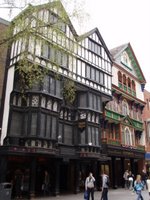(此文已于2006年5月10日发表在《独立新闻在线》,网址-http://www.merdekareview.com/news.php?n=1692)
国际贸易与工业部长拉菲达在世贸组织签署了一份内容不详、但极有可能让跨国财团控制我国资源的《服 务贸易总协定》,而能源、水务与通讯部长林敬益却在国内安抚大家说:“水供绝对不会落到跨国集团手里。”国会如今已通过水务业法案二读,大家将眼睁睁看着 他们如何让国家对资源的掌控权陷入危机。
今天,大家要记得这些将公共资源私营化、将商业利益置于人民权益之上、拥抱新自由主义经济制度的 “亡国部长”,他们公然让属于全民的天然资源成为商品及一小撮人赚钱的工具,并且毫无意图白纸黑字写下水供只能由国家继续控制的条款,这绝对是让跨国集团 可能控制我国水源的裂口。
让各州水供私营化,让每个生命赖以为生的水源成为可以买卖的商品,已是一次遗祸无穷的“掠夺”,因为连首相阿都拉 巴达威也默许公共工程无需公开投标,已经暗示人民谁将是公共领域私营化的真正获益者。但看水供公司如今竟有权在用户不缴水费后切断水供,而缴付水费的消费 者却别无选择、必须继续购买不清洁的自来水,还要自掏腰包装置上千元的过滤器,清洁的水已经成为一种奢侈品。
垄断是让人民“别无选择”的根 源,人民根本无权选择让谁管理公共水源、无权选择使用更加廉价和清洁的水,也无权选择到住家附近的河里汲水,因为河流已经在现代化及工业化的过程中被污 染,而修复河流的费用往往是像我国这样的政府极度不愿意投入的亏本生意。更可怜的是,五年一度的选举,让我们选出一些只会用双手遮住眼睛、蒙住双耳、捂住 嘴巴的所谓“人民代表”,然后还要听像林敬益这位资深部长的抱怨及反问:“如果由政府接管水务,州水务公司清盘了,接管的国家水务局该怎么做?”
还有,在国际谈判桌上的会谈结果、文件,怎么能凭几个人说了算?拉菲达签下她的大名之前,是否让国内受影响的人民了解文件内容、会谈过程?我国政府到底在《服务贸易总协定》下了什么保单?
私营化是新自由主义最影响民生一环
私 营化是新自由主义经济政策中最直接影响民生问题的一环,追根究底,新自由主义是资本主义发展中,资本继续累积、扩张的表现,倡议者相信:国家必须最低限度 的管制、最高度的开放市场,无管制的自由市场能促进自由及公平的竞争,进而取得经济发展。因此,私营化最初的理想是通过竞争提高服务效率,其另一层涵义就 是将公共资源(如:水源、石油、教育、医院)商品化,然而,实践起来,水供私营化在世界各地都引发民怨,无论是发展中国家或是先进国,都面对私人公司通过 非法手段获取水供合约、为谋利减低营运费、水源污染、水价高涨等问题。
世界银行、国际货币基金组织及世界贸易组织可说是新自由主义经济的推 销员。这个中心思想完全在世行“拯救贫穷计划”的借贷条件――“结构调整政策”的10大策略有迹可寻,除了私营化,还包括货币自由浮动、贸易自由化、削减 政府在卫生及教育的开销、确保私有产权、 让外资自由进出、解除环境保护等不利投资者的管制。
要知道新自由主义经济理论引发的矛盾及问题, 我们必须将视野放到西半球。追溯回1970年代,美国为了抑制国内通膨,不惜提高利息,拖累了拉丁美洲国家,这些国家的债务当时一翻12倍;至今,拉美各 国连利息都未还清。拉丁美洲各国做为新自由主义的实验厂,在结构调整政策中,饱受贷款国通过借贷条件强加于他们身上的经济政策,换来的是贫富悬殊、高通 膨、高失业率、天然资源落入跨国公司手里,环境被破坏,政府做为人民赋予权力管理公共财产及分配公共资源的角色被削弱,弱势群体继续处于劣势。
有 人认为:“既然本国公司做不好,交给外国人去管算了!”新自由主义一系列政策是资本主义发展的资本累积及扩张方式,这是一种新式的掠夺,在其驱动下的全球 化,就是跨国财团如何趁着各国政府(自愿或被迫)削弱工会组织力量、放松环境、企业管制后,强占别人的土地、生存环境。认清所谓“全球500强企业”不是 创造就业机会,而是迫使更多人交出赖以为存的土地、出卖劳力-被剥削的机会。
受国内法律约束的私化营公司都可以为所欲为,我们如何确保在被 迫开放水供给外国企业财团后,不会任人宰割?跨国财团凌驾国家法律的事情已经上演,墨西哥签署北美自由贸易协定后,它的一个省份在2001年因制订了保护 当地人民的环境管制条约,遭到一家跨国财团以“妨碍投资”为名起诉而必须赔偿九千万美元!
该管的不管,选举制度要来干么?
从 个人到社会、从社会到国家、从国家到全球,每个人类单位的文明起步及社会发展从一开始步伐就不一样,公平竞争的自由市场根本不可能实现,也不可能保障以出 卖劳动换取生活必需品的人民的权益。诺贝尔奖得主、世界银行前经济学家史蒂利兹已指出:“一波又一波的金融风波正是无管制竞争市场的结果。”因此,“政 府”做为唯一受人民委托来管理社会及公共资源的单位,在资源分配的工作上必须负起更大的责任,简单地说:“选你出来,该管的你不管,选举制度要来做什 么?”
资本主义发展史上,通过掠夺进行的资本累积必将遭遇受压迫人民的反抗。30多年前,新自由主义经济理论在世界银行及国际货币基金组织 的“灌溉”下已经结出恶果,腐败的私营化政策、自由贸易、开放外资、加上国家负债累累,拉丁美洲老百姓生活素质每况愈下,最终换来1990年代开始的醒 觉。它们的人民及国家领袖正在做出反抗。最近,委内瑞拉、波利维亚及古巴 联合签署了“美洲玻利瓦尔替代方案 (Bolivarian Alternative for the Americas, ALBA) ”以及 “人民贸易协定 (People’s Trade Agreement, TPC) ”,以抗衡由美国主导的“北美自由贸易协定(NAFTA)”。除了委内瑞拉总统查韦斯公然挑战美国的霸权,波利维亚新任总统莫拉莱斯上任后既制定新法重夺 该国对石油及天然气控制权,并派军驻守油库。
1999年国际上著名的“西雅图反世贸、反(企业)全球化活动”,及那之后的“世界社会论坛” 见证了弱势群体站在国际舞台上企图打破“自由市场”能解救贫穷的神话。拉丁美洲各国与北美经济、政治的千丝万缕短期内固然不能完全切断,但行动上至少敲一 敲那些推行新自由主义经济的脑袋:“嘿,你那一套害了我们三代人,我们现在要走自己的路!”现阶段,拉美各国正努力从跨国财团手中索回国家对天然资源的主 权。
国内,我们只见林敬益不断地口头上保证绝不将水源控制权交出给外国公司,却不见任何将这个承诺列入法案的行动。拉菲达呢?只有天晓得她 在国际谈判桌上签下什么文件,我们凭什么相信这位连汽车入口准证问题都左躲右闪的部长能保障我们的权益?这些掌控多数资源的少数精英可以继续利用代议士民 主无法询问每一个人的缺陷、通过践踏人民的血汗及眼泪,将手段当成目的,继续保障自己拥有的一切。
从内阁部长及在朝议员无人过问水源控制权 的问题看来,1998年勇敢对国际货币基金组织说不的大马政府,为保利益集团袋袋平安,政府仍热衷于私营化,如今不惜弃守水源控制权,无知也罢,无能也 罢,伴随近50年的政治、经济的垄断,遗害万年的种族论,人民现在还不恼火,还不行动阻止,难道还要另一个30年换取醒觉及反抗?
尽管有缺陷的法案已经通过,这不代表没有机会改变,人民还要学习许多挑战及反抗的方式,要知道,我们不是孤军作战,因为世界各地正在展开反新自由主义、反经济全球化运动,不要说你不相信拉丁美洲几个自身难保的国家能改变大趋势,没有任何改变是一朝一夕的。
Recently, Minister for International Trade Rafidah Aziz has signed the General Agreement on Trade in Services (GATS), people are worried that water industry would fall into the hands of foreigners. At the same time, Energy, Water and Communications Minister Dr Lim Keng Yaik has been trying to ensure verbally that the bills would not pose a threat to the nation’s sovereignty. However, the disputable Water Services Industry Bill (WSI) and the National Water Services Commission (Span) Bill were eventually passed in the Dewan Rakyat, we had witnessed how our government put the nation’s sovereignty of our natural resources in a critical position.
We must not forget how these ministers tried to privatize our public resources; they embrace neo-liberalism economic and allow the commercial profit come before people’s interest. Public natural resources have turned into commercial goods, and now, they have no intention of writing down any provision to retain water management under government authority in the water bills.
Water is our basic needs. The water privatization and commercialization in every state is a form of dispossession. When our PM gave his consent to the award of public construction contracts without open tender, it is patently obvious that who benefits from the privatization of public goods. Today, the private water companies have the right to terminate the water supply if consumers fail to pay their water bill, but consumers have no choice when they are supplied with unclean water, they even have to pay their own bill to install water filters, in that way, clean water has become luxury goods.
Monopoly leaves people without choices. We cannot choose people who manage our water supply, we have no other choices to access to clean and safe water. We cannot bail water from the river nearby our house as well because it has been polluted in the process of the modernization and industrialization. The cost of rehabilitating the polluted rivers is always uneconomical for our government which only cares about the profit from every project. Meanwhile, we have to suffer to the nagging of the people’s representatives like our senior Minister Lim Keng Yaik: if government takes over the water, state water companies have to wind up, how should National Water Services Commission do?
In addition, what are the contents of the GATS? Have they ever explain to the people in the country that might be affected before they sign any international trade agreements?
In neo-liberalism economic policies, privatization affects directly the livelihood of the people at most. Neo-liberalism manifests itself through the expansion and accumulation of capital in capitalism. Neo-liberalism is an economic ideology which promotes minimizing the intervention of government, and maximizing the liberalization of free market. Advocates believe that unregulated free market can accelerate free and fair competition, a country can achieve its economic growth in the end. Therefore, the initial ideal of privatization is to improve the effectiveness of the public services, in the other words, to commercialize the public goods such as water, oil, education and hospital. Unfortunately, in practice, water privatization has caused the resentment from people all over the world in both developed and developing countries. The problems that often arise include the illegal and a lack of transparency in awarding the water contract, cutting down the cost of maintenances, water pollution and rising water tariff.
World Bank(WB) , International Monetary Fund (IMF ) and World Trade Organization (WTO) can be seen as the sale-representatives of neo-liberalism. We can trace the main ideas of neo-liberalism in strategies of the Structure Adjustment Programme (SAPs)- a series of programs to eliminate poverty, which include trade liberalization, cutting down public expenditure, financial liberalization, protection on property rights, liberalization of foreign direct investment and deregulation on social protection.
To study the contradictories and inconsistencies in neo-liberalism economic policies, we have to take a look at the Latin Americas(LAs) countries. Back in the 1970s, the US increased its interest rates to address the problems of inflation and to improve their competitiveness; LAs were burdened with huge debts since then. Under the SAPs imposed by the donor countries, LAs have been suffering from wide huge gap between the rich and the poor, high inflation rate, high unemployment rate, natural resources controlled by foreign companies, environment degradation, the nation’s sovereignty has been weakened.
Some people say: “I would rather buy clean water from foreign companies!” Neo-liberalism is the way of capital accumulation and expansion in the development of capitalism, this is a new form of dispossession. Globalization driven by this trend is substantially giving a chance to multinational companies to occupy common lands and people livelihoods after the countries were forced to weaken their workers’ unions, and abolishing regulations formulated for environmental reasons. The so-called “global 500 corporations” are not providing job opportunities but forcing the powerless to give up their lands, on which they depend - means of existence- and live upon selling their labour- to be exploited.
Even the local private companies had failed in abiding our national laws and regulations, how do we ensure the benefits of the commons if we are forced to liberalize our water industry to foreign company? There are a lot of examples where multinational companies superseded a country’s legislative. For instance, in 2001, one of the provinces in Mexico was ordered to compensate 90million dollars to a multinational company under the conviction of “expropriating” its investment because the local government has regulated some environmental laws to protect local people.
From an individual, a society, a country, to global, there are big differences between every society and the process of development, it is impractical to push fair competition in every society, it is also impossible to ensure the rights of people to access to their basic needs through free market. Nobel laureate Joseph Stiglitz has already pointed out that unregulated markets competition is the cause of financial crisis. Therefore, governments have great responsibilities in managing and distributing public assets and social resources. In a nutshell: “if you are reluctant to bear these responsibilities, what’s the purpose of electoral system? ”
In capitalism, enclosure and accumulation by dispossession is a process of unifying the oppressed. Three decades ago, the neo-liberalism imposed by the WB and IMF has brought numerous evil consequences such as corruption in privatization, heavy debts and the low quality of standard of living. Those nations began to resist in the 1990s. Recently, Venezuela, Bolivia and Cuba signed Bolivarian Alternative for the Americas(ALBA ) and People’s Trade Agreement(TPC). The president of Venezuela has criticized the US publicly, the new president of Bolivia Mr.Morales wanted to renegotiate of existing contracts on terms that would provide a greater share of the revenues for the state.
During 1999, there were anti-IMF and anti-globalization(anti-corporation) movements in Seattle, NGOs that gathered at World Social Forum was trying to make a clear voice that the free market cannot eliminate poverty.
Back to Malaysia, there is no action to amend the water bill, making it easier for foreigners to enter and take over the water sector. Only god knows what sort of agreement had been signed by Rafidah in trade negotiation, how do we believe a minister like her- still remains tight-lipped on APs scandal- can safeguard people’s rights and interests?
No member of parliament shows their concern about the control of our water, our government that have bravely rejected the conditional aid provided by IMF in 1998, nowadays have gave up their rights of controlling our resources in order to protect their cronies. If we still ignorant to the 50 years of political and economical dominance, and racism, are we going to endure for another 30 years ?
However, it is important to notice that we still stand the chance to change, we need to learn to challenge and resist, because it is a trend now, there are anti-neoliberalism and anti-globalization movements all over the world. It is still early to say that countries in LAs will not succeed, because nothing is changed overnight.
#
 在医院打工也有一个星期了,鸡手鸭脚的我今天还是忘了不必对厨师说明是糖尿病人的食物,只需在病人只能吃软性食物或液体食物的情况时才特别交待主厨。医院准备给糖尿病人的食物,除了甜品分成两种,主菜是适合他们的。
在医院打工也有一个星期了,鸡手鸭脚的我今天还是忘了不必对厨师说明是糖尿病人的食物,只需在病人只能吃软性食物或液体食物的情况时才特别交待主厨。医院准备给糖尿病人的食物,除了甜品分成两种,主菜是适合他们的。 Today is the fifth day since I started to work in the hospital as a catering assistant. Still, I feel panic and stressful during the working hours. I am afraid that I might serve wrong food to patient who is only allowed to “soft diet”, “dysphagia soft” or “diabetes diet ”. In hospital, apart from desserts, main courses are all suitable for diabetic patients, I just need to inform the chef when the patient is soft diet or dysphagia.
Today is the fifth day since I started to work in the hospital as a catering assistant. Still, I feel panic and stressful during the working hours. I am afraid that I might serve wrong food to patient who is only allowed to “soft diet”, “dysphagia soft” or “diabetes diet ”. In hospital, apart from desserts, main courses are all suitable for diabetic patients, I just need to inform the chef when the patient is soft diet or dysphagia.









